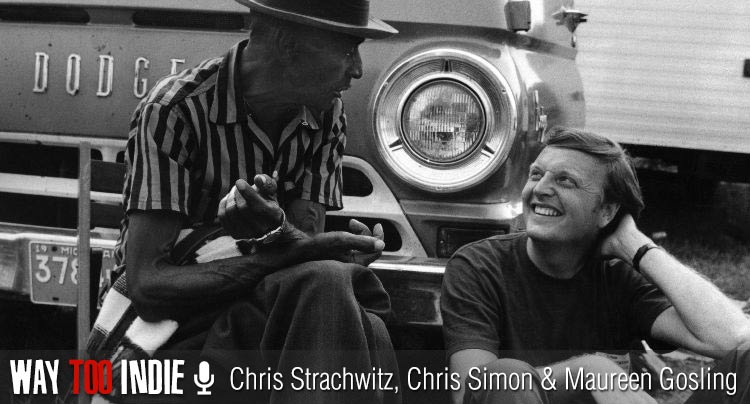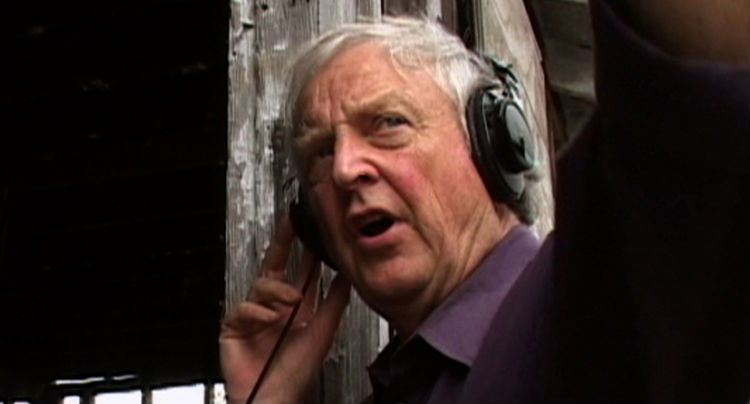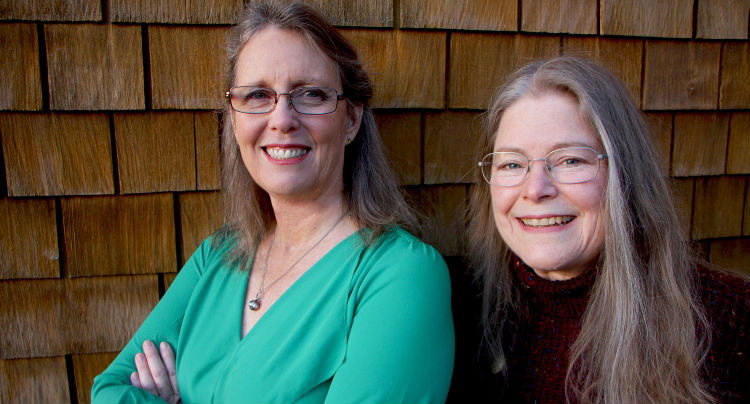Arhoolie Records Founder Chris Strachwitz on ‘Hardcore’ Music, the Joy of Record Hunting

“If somebody wants to sing, sing god damn it!”
Chris Strachwitz, founder of Arhoolie Records and purveyor and evangelist of obscure, down home blues music, isn’t the biggest fan of modern pop music. He likes the “hardcore stuff” (whatever that means). He likes no-nonsense music that grabs you by the throat and doesn’t let go, and he’s been recording artists like Mance Lipscomb and Clifton Chenier play their music in living rooms, front porches, and front yards since the label was founded in 1960.
Filmmakers Chris Simon and Maureen Gosling celebrate American minority roots music through Chris’ story in This Ain’t No Mouse Music, a documentary that, in chronicling Strachwitz’s life, invites us to discover the true beauty of music that’ll rough you up a bit.
We caught up with Strachwitz, Simon, and Gosling in San Francisco where we got to the bottom of what “hardcore stuff” really is, talked about Strachwitz‘s love of spontaneity, his approach to live music recording, Simon and Gosling mirroring his style in their filmmaking, exposing young people to down home music, the joy of record hunting, and much more.

Chris, there’s a dichotomy about you I want to talk about. Some of your colleagues describe you as a bit of a perfectionist, but on the other hand, the way you record music is typically on-the-fly and spontaneous.
Strachwitz: I don’t consider myself a perfectionist at all! I’m not sure who said that. If the band’s totally out of tune, I’ll say, “Listen, guys. This has got to stop; let’s see what’s going on here.” I like spontaneity. That’s very true. I used to love these Bob Wills records. But all of a sudden, when they reissued them in the complete Bob Wills sets they had a alternate takes on “Steel Guitar Rag” He starts the track saying “Look out, friends! Here comes Leon!” I thought they improvised all that on the spot, but it was exactly the same way on all the alternate takes. They were professional recordings, but I thought they were much more ad-lib. Some are. That’s why I like Lightning Hopkins so much, who seems to be totally spontaneous. Once I heard him in that beer joint in Houston I was convinced that he would just make up stuff on the spot. Whatever happened to him that day. He was really a rapper, but he sang gorgeously and with a guitar. Much better than any rapper.
That’s the great thing about musicians like Lightning Hopkins: I feel that, whether you were there or not, he’d be playing those songs. You were just lucky enough to capture it, and we’re lucky enough to hear the recordings. There’s a real purity to him. He’s not contriving anything.
Strachwitz: Later on he did. He had to memorize songs, because once it was on a record and people kept asking for it, he had to relearn it.
How did he feel about that?
Strachwitz: He was sometimes rather bored with it. You could tell because he’d sometimes play songs endlessly. You knew he had to sit there for an hour. Jazz musicians sometimes feel the same thing. If they have a session to do an album, they can blow for 40 minutes, although I guess they do have a theme to come back to. But since I’m not a musician, I can’t really judge that sort of thing so well.
The way you record–sometimes outdoors, sometimes hanging mics from lightbulbs–what is it about that technique that’s so magical? Is it the room noise? The sound of random things in the distance?
Strachwitz: I don’t even think about that. It’s the fact that the [musicians are] there with this message that they want to get out and sing. It’s “cranked up”, so to speak. Back in those days, making a record was something unusual. Today, it isn’t. Everybody’s making records in their garbage can studios. [laughs] In the early days of minority music recording, those records were meal tickets. They didn’t think about them as anything but that. If you could get a record on a juke box, people might hear you. They might like you. They might even pay to hear you. You see? That’s the way to get off the cotton fields and the packing sheds, to get away from manual labor, which is where almost all of them came from.
Let’s talk about the filmmaking. Is the way Chris records music the same way you try to film?
Simon: Yup. That pretty much describes it. We like being in the field.
Gosling: We’re always looking for, as Les Blank would call them, these “golden moments”. I think that coming from a film background–as in shooting on film as opposed to video–has given us…[pauses]. Well, when you’re burning up film, it costs hundreds of dollars, so you had to go for the moment that was the best. That is what we bring to what we’re shooting now, even though it’s digital. Chris isn’t going to shoot and shoot and shoot if it’s boring. She wants to shoot for the best stuff. It’s the same with editing. We want to look for the most expressive, spontaneous thing as much as possible. We leave people out who are too stiff or aren’t really responding. It helps to make the film more vibrant, more like a haiku than some rambling thing.
In that way, your approach sounds exactly the same as Chris’.
Gosling: It is exactly the same, and we learned from him and Les, so there you go! [laughs]
Strachwitz: The only thing I feel bad about sometimes is the fact that so many of these musicians wanted me to be their agent or their promoter. I was never interested in that; I wanted to capture things I loved when I heard them. It’s just the way it was. Selling those recordings has always been my weak point. As a small company, you have a really hard time beating the bushes and getting your stuff out there. My experiences with a major companies were always unsatisfying. I used to get the blame for the fact that nothing materialized. That’s especially true with Clifton Chenier. I always told him, “If somebody comes tomorrow and gives you a better deal, you’re free to go.” I never had any exclusive contracts with anyone.
There’s rarely a moment in the film where there’s music playing and Chris isn’t beaming. Talk about getting that across in the film.
Gosling: We certainly go for that. I find, when I’m editing, if I don’t know the characters, I fall in love with them when I’m editing the footage. We know what to look for.
Simon: We want to have that positive feeling. Chris does beam [when music is playing]. There are a lot of bummer films out there. We want people to walk out of the theater feeling better than when they walked in.
Strachwitz: Unless they hate that music! [laughs]
Simon: I’ve gone to so many film festivals, and I’d say the vast majority of films make you want to kill yourself.
This is Way Too Indie. That’s all I watch! [laughs]
Simon: [laughs] Chris has an antidote for that, and we wanted to portray that happiness. We like being happy.
There’s that great scene near the end of the film where Chris is showing these young musicians old records in his music shop, introducing them to Mance Lipscomb and the like. Chris, how happy does it make you to show this music to young people?
Strachwitz: That was really quite extraordinary. I never had any children, and I forget how quickly a generation goes from one to the next. These guys had never heard many of the sounds that I was exposed to.
Gosling: That’s one of my favorite scenes. They were so excited. I wasn’t there when that happened, but I was introducing them at a festival and they were rambling on and on about how excited they were to be at Arhoolie. It was really sweet.
Excuse me for how ignorant this sounds, but I’d never heard accordion played so soulfully before seeing this film.
Gosling: I would have to say that I had a very similar experience. The baggage that I had was the Lawrence Welk baggage.
Simon: Lawrence Welk was really good! [laughs]
Gosling: Now I would probably enjoy him, but before, that was my only reference for accordions. The first film I worked on, Hot Pepper with Les Blank, was about Clifton Chenier. We were going to black dance halls in French Louisiana. It was unbelievable. The soul of that accordion music is incredible. I realized that there’s a passion in each of these traditions, and you just have to look for it. It’s there.
 Simon & Gosling
Simon & GoslingSimon: There are so many different types of music that the accordion is essential to. I’m doing a film right now on a type of music called Dutch Hop, which is a polka music with accordion as the lead instrument and hammer dulcimer as the second lead. Lawrence Welk was also a Dutch Hop musician. I realized how great that music was. We just didn’t appreciate it.
Chris, in the film you say that, as far as music goes, you like the “hardcore stuff”. What’s “hardcore stuff”?
Strachwitz: [laughs] It’s without any saccharine attitude. So much of pop music has all this slop added, with this mush background that I can’t even call music. [makes buzzing sound] You can hardly hear the voices! They bury the voices. If somebody wants to sing, sing god damn it! You know? In the old days, you could hear them sing.
Is sentimentality not appealing to you?
Strachwitz: Sometimes it is. In Mexican songs there’s a lot of sentimentality involved.
I was listening to “Mal Hombre” by Lydia Mendoza earlier.
Strachwitz: That’s a tough song.
Simon: I dragged Chris to a Hawaiian concert once. He whined the whole way over, but he had a really great time by the end. There was some saccharine stuff going on, but all of a sudden one guy came on and punched it. That might be another term for it. It’s not, “Lalalalala…” It’s like, “Listen to this!”
Chris, describe the feeling of finding a record you’ve been looking for for years.
Strachwitz: I can tell you about a recent experience. This wonderful lady in Denver gave a whole collection from her radio station to the Arhoolie foundation, these old Mexican records. My friend and I went up there to pack all these records up, and there were a lot of 78s, over 1,000 or more. I came across a red label 78 that had Lydia Mendoza on it. It was not an Azteca. The only red label she recorded on was Azteca, so I said, “What is this?!” It was called “Music of Mexico Records”. I’d never heard of such a label! There was a name of a record shop in Denver on it, and it was a record she’d recorded in Denver. I’ve never seen another copy of it since. I flipped out. It was an unknown Lydia Mendoza record. As I kept packing, there was another one. I thought maybe it was an extra copy, but no! It as number two! I discovered two unknown Lydia Mendoza records in that stash, and only one copy of each.
Starting tomorrow, there will be a series of This Ain’t No Mouse Music screenings and Q&A’s around the Bay Area:
September 18 at Rialto Cinemas Cerrito in El Cerrito 7pm
- Directors Maureen Gosling & Chris Simon, Chris Strachwitz in person
September 19 at Rialto Cinemas Elmwood in Berkeley 7pm
- Chris Strachwitz in person for Q&A music by Michael Doucet
September 19 at Roxie in San Francisco – 7pm
- Post-screening Q&A with Maureen Gosling
September 19 at Smith Rafael Film Center in San Rafael – 7pm
- Q&A with Chris Simon & Bonnie Raitt. Co-director Chris Simon will be joined by film participant Bonnie Raitt for a discussion following the screening.
September 20 Roxie in San Francisco – 7pm
- Post-screening Q&A with Chris Simon
September 20 Smith Rafael Film Center in San Rafael – 7pm
- Before the screening, music by HowellDevine. Q&A after screening with Chris Strachwitz and Maureen Gosling
September 21 Rialto Cinemas Sebastopol in Sebastopol – 7pm
- Q&A Chris Simon, Maureen Gosling – followed by music by Will Spires
